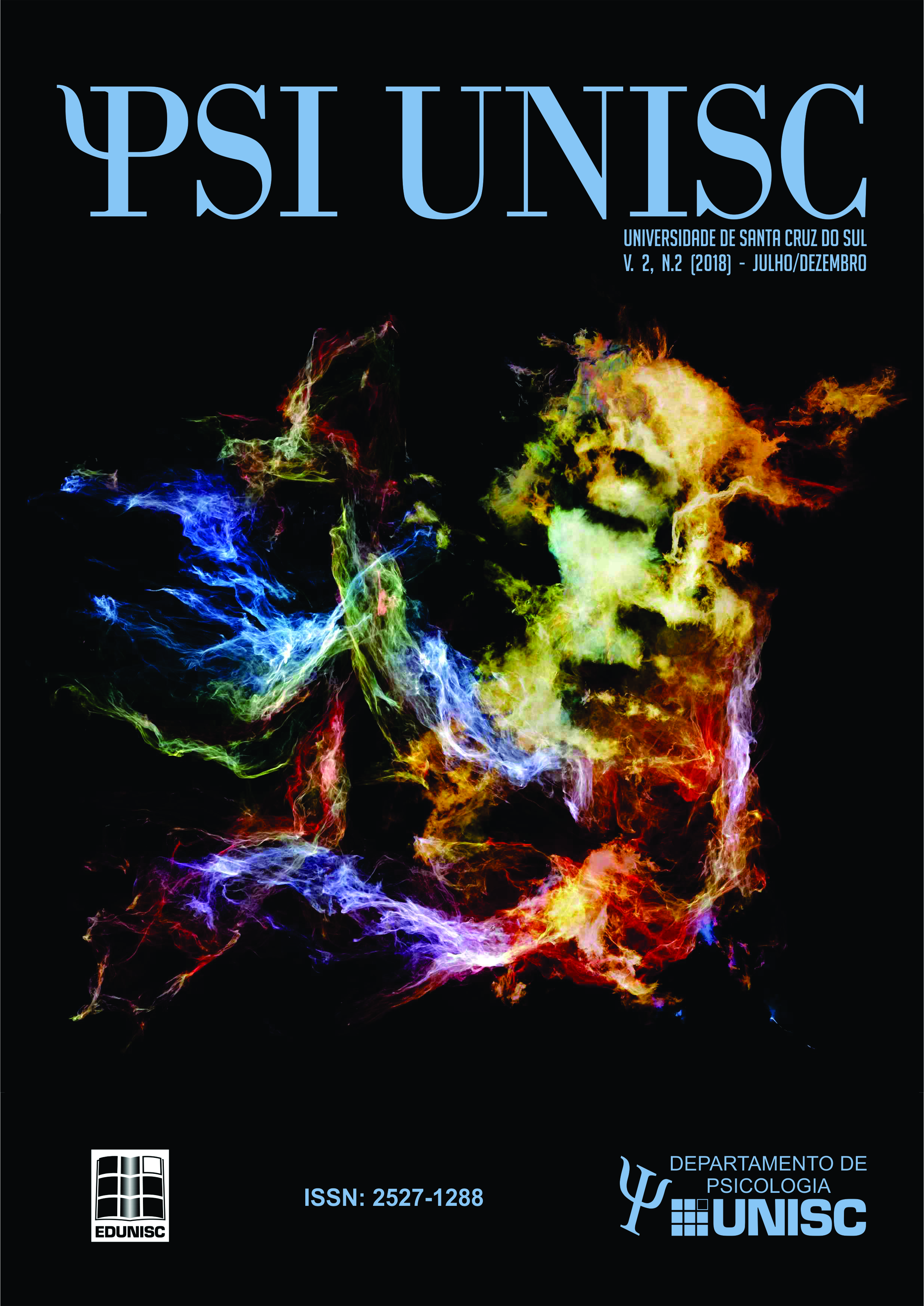Psychology and Post-Truth: the Emergence of Digital Subjectivity
DOI:
https://doi.org/10.17058/psiunisc.v2i2.12242Keywords:
Psychology and post-truth, Digital subjectivity, Algorithm, TechnoliberalismAbstract
Through a critical analysis known as Post-truth, this paper discusses two interconnected themes. The first one investigates the important role that psychology plays in the recent socio-anthropological environment and its main political and economic repercussions. The second theme explains the concept of subjectivity and how different dimensions of the human beings are influenced with the preponderance of technoliberalism and the new medias. This new process propitiates the construction of a new kind of subjectivity, which could be named as digital subjectivity. The investigation also reveals that the implementation of these media practices manipulates the human being itself. The digital administration of human life transforms itself into a new object of consumption. The new media seek to comprise all the sequences of the human experience, which results in the commodification of the whole life.Downloads
References
Alterman, E. (2004). When Presidents Lie: A History of Official Deception and Its Consequences. United States of America: Penguin Group.
Amon, D. (2017). O contexto sócio-antropológico da pós-verdade. In P. Guareschi, D. Amon, & A. Guerra (orgs.), Psicologia, Comunicação e Pós-verdade (pp. 25-52). Porto Alegre: Evangraf.
Amon, D., & Idiart, S.A. (2017). Linguagem: uma abordagem histórica e conceitual para a compreensão e crítica à Pós-verade. In P. Guareschi, D. Amon, & A. Guerra (orgs.), Psicologia, Comunicação e Pós-verdade (pp. 53-81). Porto Alegre: Evangraf.
Barthes, R. (2011). The Preparation of the Novel: Lecture Courses and Seminars at the Collège de France, 1978-1979 and 1979-1980. Nova Iorque: Columbia University Press.
Bruto, F. (2013). Máquinas de Ver, Modos de Ser – vigilância, tecnologia e subjetividade. Porto Alegre: Sulina.
Dias, T., Varon, J., Teixeira, L., & Felizi, N. (2017, 11 de julho). Como funciona o lucrativo mercado dos estereótipos online. Recuperado de https://motherboard.vice.com/pt_br/article/a3djgz/como-funciona-o-lucativo-mercado-de-estereotipos-online Acesso em 4 de setembro de 2017.
Eco, U. (1976). A Theory of Semiotics. Bloomiongton: Indiana University Press.
El Pais (2018). Pivô da polêmica sobre Facebook, Cambridge Analytica fecha. https://brasil.elpais.com/brasil/2018/05/02/internacional/1525285885_691249.html
English Oxford Living Dictionaries, (s.d.), Word of the Year 2016 is... Recuperado de https://en.oxforddictionaries.com/word-of-the-year/word-of-the-year-2016 Acesso em 15 de agosto de 2017.
Freire, P. (1979). Educação como Prática da Liberdade. Rio de Janeiro: Paz e Terra.
Gonzalez Rey, F. (2004). O Social na Psicologia e a Psicologia Social: a emergência do sujeito. Petrópolis: Vozes.
Guareschi, P. (1990). Igreja da Unificação. In L. Landim (org) Sinais dos Tempos (pp.245-252). Rio de Janeiro: ISER.
Guareschi, P. Amon, D., & Guerra, A. (2017). Psicologia, Comunicação e Pós-verdade. Porto Alegre: Evangraf.
Guerra, A., & Barbosa, C. (2017). Crítica e Pós-Verdade. In P. Guareschi, D. Amon, & A. Guerra (orgs.), Psicologia, Comunicação e Pós-verdade (pp. 101-160). Porto Alegre: Evangraf.
Halpern, S. (2017, June 8). How He Used Facebook to Win. In The New York Review of Books, June 8, 2017 Issue.
Hartford, T. (2017, 10 de março). Na era da pós-verdade, os fatos precisam de defensores. In Folha de São Paulo. Recuperado de https://www1.folha.uol.com.br/mundo/2017/03/1865256-na-era-da-pos-verdade-os-fatos-precisam-de-defensores.shtml
Jovchelovitch, S. (2007). Os Contextos do Saber: representações, comunidade e cultura. Petrópolis: Vozes.
Kepel, G. (1994). The Revenge of God. Cambridge: Polity Press.
Keyes, R. (2004). The Post Truth Era – Dishonesty and Deception in Contemporary Life. Nova Iorque: St Martin Press.
Marx, K., & Engels, F. (1848). O Manifesto Comunista. Versão para eBooks Ridendo Castigat Mores, eBooks Brasil.com.
Marx, K. & Engels, F. (1989). Teses sobre Feuerbach. In K. Marx, & F. Engels, A Ideologia alemã (Introdução). São Paulo: Martins Fontes.
Moscovici, S. (2003). Representações Sociais: investigações em psicologia social. Petrópolis: Vozes.
Pita, M. (2017). Facebook negocia dados de milhões de jovens emocionalmente vulneráveis. In Carta Capital. Recuperado de https://www.cartacapital.com.br/blogs/intervozes/facebook-negocia-dados-de-milhoes-de-jovens-emocionalmente-vulneraveis. Acesso em 11 de setembro de 2017.
Priolli, G. (2017, 13 de janeiro). A era da pós-verdade. In Carta Capital. Recuperado de https://www.cartacapital.com.br/revista/933/a-era-da-pos-verdade. Acesso em 22 de abril de 2017.
Reis, H. (2017, 10 de janeiro). O mundo da pós-verdade. In Homero Reis. Recuperado de http://homeroreis.com/o-mundo-da-pos-verdade/. Acesso em 25 de abril de 2017.
Sadin, É. (2009). Surveillance globale:Enquête sur les nouvelles formes de contrôle. Climats/Flammarion.
Sadin, É. (2011). La Société d’anticipation. L’Echappée (traduzida para o espanhol em 2013. Buenos Aires: Editora Caja Negra).
Sadin, É. (2015a) La vie algorithmique: Critique de la raison numérique. L’Échappée.
Sadin, É. (2015b). Le techno-capitalisme cherche à exploiter chaque séquence de l’ésistence. Sociétés 2015/3 (n.129), p.73-77). Entrevista concedida a Pierric Marissal.
Sadin, É. (2016). La silicolonisation du monde: L’irrésistible expansion du libéralisme numérique. L’Échappée.
Sadin, É. (2017a). O tecnoliberalismo lança-se à conquista integral da vida. In IHU Newsletter – Instituto Humanitas Unisinos. Entrevista de Eduardo Febbro, publicada por Página/12, Buenos Aires, 23-06-2017,
Sadin, É. (2017b). A Era do Anti-Humanismo Radical. In IHU Newsletter – Instituto Humanitas Unisinos.Entrevista ao jornal argentino Rio Negro, 27 de junho de 2017 Tatiana, D., Varon, J., Teixeira, L, e Felizi, N. (2017). Como funciona o lucrativo mercado de estereótipos online. Recuperado de https://motherboard.vice.com/pt_br/article/a3djgz/como-funciona-o-lucrativo-mercado-de-estereotipos-online Acesso em 11 de setembro de 2017.
Wittgenstein, L. (1992). Tractatus Logico-Philosophicus. S.Paulo: Martins Fontes.
Downloads
Published
How to Cite
Issue
Section
License
The submission of originals to this journal implies the transfer, by the authors, of the printed and digital publication rights. The copyrights for the published articles are those of the author, with periodical rights on the first publication. Authors may only use the same results in other publications clearly indicating this journal as the medium of the original publication. Because we are an open access journal, we allow free use of articles in educational and scientific applications provided the source is cited under the Creative Commons CC-BY license.




